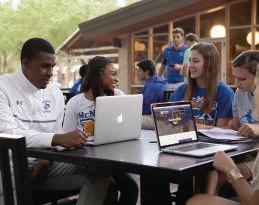
1 minute read
WHY MCNEESE?
Here are just a few reasons to make McNeese your first choice ...

Advertisement
Hands-On Experience:
Every mass communication major participates in an internship before graduation, where they have the opportunity to partner with local organizations and businesses and work in a professional environment in the field.
Service-Based Classes:
Service-based classes connect mass communication majors with university or local clients. In these classes, students gain experience identifying and meeting client needs and goals, analyzing customer bases, working within a budget and creating media materials.
Networking Opportunities:
Every year, mass communication students visit national and regional conferences to learn about the latest media tools and techniques and network with professionals in public relations, journalism and media.
Expert Faculty:
The core faculty of McNeese?s Department of Mass Communication are experienced professionals specializing in public relations, persuasive communication and digital, broadcast and print production. With small classes and one-on-one advising, students receive personalized career and academic guidance.
Professional Organizations
The Public Relations Student Society of America connects participating McNeese students with highly qualified public relations professionals for career development, while the Society for Professional Journalists supports student journalists as they begin their careers and is dedicated to encouraging the free practice of journalism and high ethical standards.
Student Activities
McNeese?s Speech and Debate team competes nationally and provides students the opportunity to practice public speaking, debate and persuasive communication techniques. The McNeese chapter of Lambda Pi Eta, the National Communication Honors Society, is open to outstanding communication majors and minors and encourages excellence in communication studies among its members.
Mass Communication Concentrations
Integrated Digital Media
Explore how to use different media platforms to develop and distribute the most effective messages to the right audiences at the right times.
Journalism
Learn the best practices of responsible journalism, from gathering facts and writing engaging content to creating web content and distributing news through traditional and digital channels.
Public Relations
Discover how to develop policies and programs to build positive relationships with diverse groups through media relations, crisis communication and social media management.

